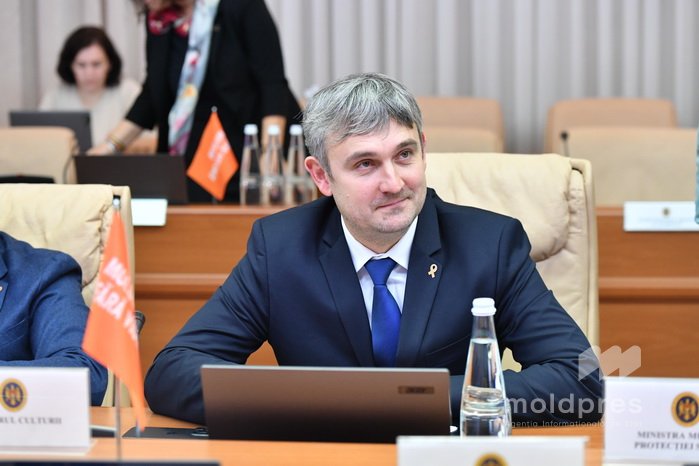
Moldova to have extended access to UNESCO emergency funds for protection of heritage
The government has approved the accession to the Second Protocol of the 1954 Hague Convention, a document that strengthens international mechanisms for the protection of heritage in emergencies.
At the cabinet meeting, Minister of Culture Cristian Jardan said that Moldova had been a party to the Convention since 1999, when the first protocol was ratified, along with over ninety other states.
“Now, we are set to approve the second protocol. The document establishes clear procedures for risk prevention, protection of cultural goods and prevention of their use for inappropriate purposes,” the minister specified.
A major advantage of accession is access to the UNESCO Heritage Emergency Fund, a tool through which Moldova can benefit from financial support and technical expertise in critical situations.
“This fund can support, has already supported Moldova through quick interventions in emergencies,” Jardan emphasized.
According to the culture minister, through this step, the country strengthens its cooperation with UNESCO, member states and international organizations specialized in mobile cultural heritage protection.
The 1954 Hague Convention is the first international treaty dedicated exclusively to the protection of cultural property in cases of armed conflict. After the conflicts of the 1990s, the international community found that the initial system was no longer sufficient to prevent the deliberate destruction of heritage. Thus, in 1999, the Second Protocol was adopted, modernizing the Convention and introducing much stricter rules for protecting monuments, archaeological sites, museums, archives and other cultural assets of major importance.
The Second Protocol introduces enhanced protection for sites of exceptional importance, establishes the prohibition of using cultural assets on military purposes, obligates states to prevent attacks on them, and for the first time, provides criminal sanctions for serious violations, such as deliberate destruction or their use in military operations.
At the same time, the Protocol obligates states to take protective measures even in peacetime and creates an international committee that monitors the application of the rules and provides assistance to states.
PHOTO GALLERY // Meeting with writer Ana Blandiana at National Library of Moldova
Children against War exhibition inaugurated at Embassy of Ukraine in Moldova
PHOTO GALLERY // Moldovan capital kicks off winter holidays
Moldova, Israel to sign agreement in cinematography
PHOTO GALLERY // ROYAL exhibition, homage paid to Queen Marie, inaugurated at Moldova's National History Museum
PHOTO GALLERY // Inauguration of group exhibition, THE COLOURS OF SOIL, at Moldova's National Art Museum
Moldovan culture minister, EU Ambassador discuss expansion of European cultural programmes
Moldova joins Creative Europe Programme; Culture minister says country to benefit from European funds dedicated to culture, media, creative industries
New opportunities for artists, culture sector professionals: Moldova to join Creative Europe Programme
Licurici Theatre hoisted European Union flag, affirming belonging to European cultural family
Moldova accelerates digital transformation in culture with UN support
Moldova joins UNESCO Executive Board for the first time; Moldovan culture minister describes move as great responsibility, opportunity to promote country's values
Registrations start for Eurovision Moldova 2026; Moldova 1 TV station launches National Selection
PHOTO GALLERY // Double launch at Ethnography Museum: ''House chamber for guests and feasts. Palliative cares''
Economic agents from Transnistrian region continue to export predominantly to European Union market
Over 240 freelancers registered in first days of new tax regime in Moldova: legal work with lower taxes
Moldovan deputy PM, counterpart from United Kingdom discuss development of economic cooperation
Miracle at Gheorghe Paladi Hospital from Moldovan capital: baby boy born at just 25 weeks of gestation discharged in good health
Moldovan energy minister announces when first quantities of electricity to flow through the Vulcanesti–Chisinau power line
VIDEO // Moldova to compete at first semi-final of Eurovision 2026
DOC // National Programme for Accession to European Union for 2025–2029 published in Moldova's Official Journal
VIDEO // Benefits for freelancers of Moldova, after new law enters into force: legal work, simple procedures, low taxes
Moldovan citizens might pay less for gas; energy minister says there is opportunity to cut tariff
Modernized roads' infrastructure in another 42 settlements of Moldova through Europe is Close Programme
VIDEO // Moldovan president says right now there is majority that supports EU accession, leadership acts to this end
Moldovan Central Electoral Commission says over half of political parties have not yet started financial reporting
IT sector of Moldova generates over one quarter of total services' exports, exceeding 600 million U.S. dollars in value
Former MPs, state officials of Moldova, including Vlad Plahotniuc, Serghei Iaralov, to testify in Kuliok file
Moldovan Justice Ministry continues modernization of penitentiary system: new prison to be built by 2029
VIDEO // Moldovan authorities announce tax incentives for citizens who purchase life insurance policies

